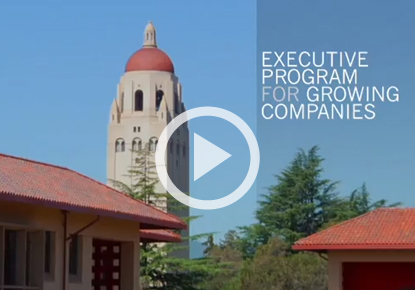The program has been very helpful to me in framing dialogs with the rest of our management team to think through the various options and actions strategically, and optimally. As a result, instead of simply stating a strategic goal, we are identifying the key success factors that will ensure that we actually achieve the goal.
– Robert L. Dunn, CMA
Chief Financial Officer
Mocana Corporation
EPGC was one of the best experiences I've had. The class sessions were great, the professors very knowledgeable and talented and the class was full of brilliant people, many successful serial entrepreneurs indeed… Currently I'm doing business with two different classmates and I have projects for the near future with at least other two.
– Fermin Ezquer-Matallana
Executive Director/Owner
Think Creative Biznets
I gained specific tools for sharpening my organization's strategic focus. Robert Burgelman's presentations alone and their impact on my thought processes were worth the price of the program. The quality of the program in all areas―faculty, lectures, accommodations, food, staff, etc.―far exceeded my expectations. I will definitely consider these 14 days one of the best investments I have ever made!
– Timothy W. Attebery
Chief Executive Officer
South Carolina Heart Center, P.A.
EPGC provides insight into management of people through culture rather than through control mechanisms. For two weeks, we studied a superb array of cases of how other companies succeeded or failed and why. The Stanford faculty is not only on the cutting edge of new learnings but has the teaching skill to impart that learning to me and my colleagues.
– Stephen Schneider
President and COO
Alexza Molecular Delivery Corporation
The strategic frameworks were very timely and I will be able to use them to improve the execution of our strategy at Memec. In general, EPGC stimulated many new ideas and methodologies that will prove useful for both leadership and management upon my return to the office.
– Greg Provenzano
CEO Americas
Memec
Excellent! The insight of leading management theories combined with practical cases was very helpful. The interaction among the participants was invaluable.
– Eugene H. S. Wong
Principal Head of Singapore
Crimson Ventures
Stanford's Executive Program for Growing Companies has been an empowering experience. The excellent faculty and curriculum, quality minds from varying disciplines and countries, and the business networks will benefit me for the future. The program overall has been rejuvenating, enlightening, and invigorating.
– Bill Ten Pas
Vice President
ODS Health Plans








